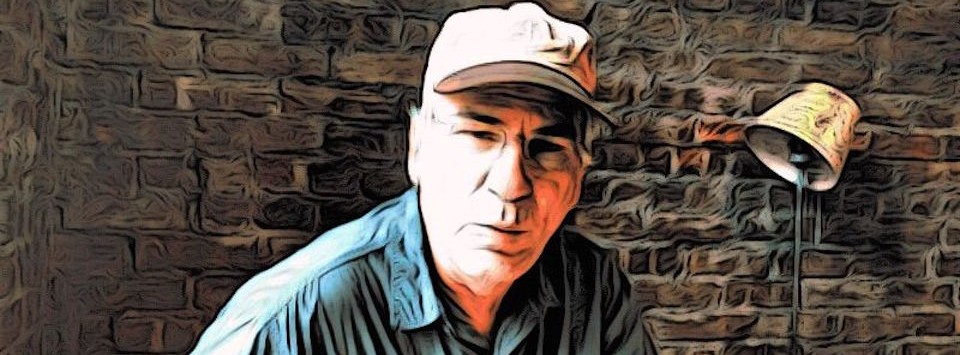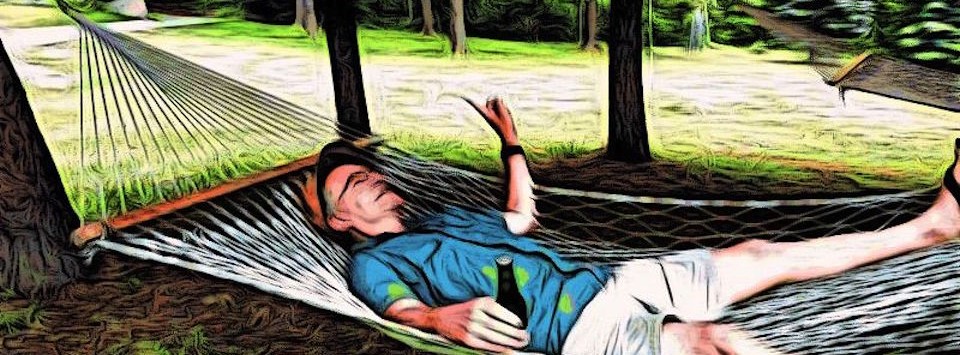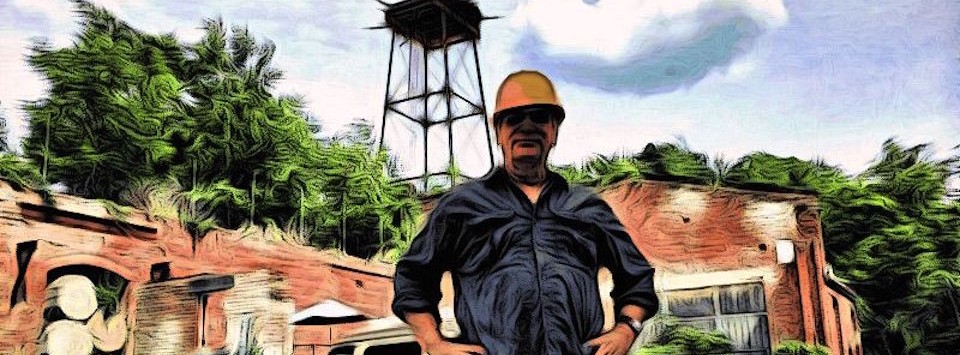Archive: The Frequency Illusion
Everything Old is New Again

My good friend Jeff Mann, the true Yard Ramp Guy, has asked me to revisit some of my original posts. This week in my From the Archives series: all about frequency and illusion...and frequency illusion.

Rinse, Dry, Repeat
The other day, one of my grandkids was telling me about a video game he’d been playing. Kids being kids in the 21st century, this was hardly an unusual occurrence, and I was only halfway paying attention. (And, um, please don’t tell Maggie; it’ll just encourage her conspiracy theory that I’m not listening.)
Then: a couple days later, a friend mentioned that their kids were playing that same game. And then I saw an ad for the game. And then I saw a news article about it. Now, this was not a new game or trendy fidget spinner-like sensation. It'd been around for a bit. So why, all of a sudden, was it appearing in my life?
It probably wasn't, actually. If I'd been paying attention, I'm sure I would have noticed this video game’s presence for some time.
The human brain tends to be extremely selective about what it pays attention to. This is sometimes known as the Baader-Meinhof phenomenon.
Essentially, what happens is that your brain gets really excited about this new thing and starts noticing it much more often, whereas before that same brain of yours might have just dismissed it as unimportant.
The Baader-Meinhof phenomenon has one of the weirder names in psychology. Most monikers for stuff like this have to do with its discoverer or researcher, but Baader-Meinhof was a West German terrorist group in the 1970s. It's actually a nickname; the frequency illusion is the preferred name.
An anonymous poster on an Internet forum had been discussing how he'd learned about the terrorist group. The next day, he came across a gaggle of seemingly random references to Baader-Meinhof, just as the name of my grandson’s video game kept popping into my life.
If this seems like a weird brain quirk, in terms of evolution, it actually makes a lot of sense. There's way too much happening in the world for us to really pay attention to all of it, so we need filters for the important stuff. Like video games. And everything Maggie says.
Yard Ramp Guy Blog: Enhancing Our Services
This week, my friend The Yard Ramp Guy is growing his business ⏤ naturally, in a really smart and strategic way. And his three new team members seem like just the right choices.
Click HERE to read about the evolution of the business.

Archives: The Bone Wars
Marsh and Cope Have a Falling Out

My good friend Jeff Mann, the true Yard Ramp Guy, has asked me to revisit some of my original posts. This week in my From the Archives series: it ain't easy studying dinosaurs.

Beware of Humans
There's one field of geology notably unrepresented at the United States Geological Survey: paleontology. This seems like a fairly major omission, and it's all thanks to a series of events known as the Bone Wars.
During the Gilded Age (the last thirty years or so of the 1800s in America), paleontology was an incredibly competitive field. At the time, we collected dinosaur fossils more rapidly than ever before. Two figures stood out above all the rest—Edward Drinker Cope, of the Academy of Natural Sciences of Philadelphia, and Othniel Charles Marsh.
Marsh and Cope began as friends when they first met in Berlin (Germany has always been a paleontological treasure trove), but their relationship began to sour quickly. By the early 1870s, things heated up to an absurd degree. A series of mishaps, oddities, and minor snubs, along with the fundamentally incompatible personalities of the two men, irrevocably ruined things between them.
In 1873, the Bone Wars began in earnest. The first shots fired were academic ones: renaming and reclassifying species to mess with the other, publicly pointing out one another's errors, and the like.
If things had stayed like that, it wouldn't have made history the way it did; academic rivalries are, as they say, a dime a dozen. However, the confrontation escalated rapidly from there.
Marsh and Cope began hiring employees away from one another, bribing officials to advantage themselves and hurt the other, stealing fossils from one another's sites, and so on and so forth. They actively tried to destroy one another's reputations, and even turned to destroying fossils rather than letting the other get his hands on them.
Financially and professionally, the rivalry eventually ruined both of them, and they never abandoned it.
The two scientists discovered 136 new species during the Bone Wars, including Triceratops and Stegosaurus. (Before then, we had only nine named species of dinosaur in North America.)
Unfortunately, the Bone Wars also did much to damage the reputation of American paleontology. It resulted in the loss of numerous fossils, the USGS losing its paleontology division, and a severe, decades-long blow to the reputation of American paleontology.
Yard Ramp Guy Blog: Warehouse Connection
This week, my friend The Yard Ramp Guy reminds us of his focus on safety and ⏤ what's this? ⏤ describes a ramp that's a level plane? Blasphemy, I say.
Click HERE to be bothered by it all.

Archive: Corinth Canal
Or: Taking Their Time to (Not) Get it Right

My good friend Jeff Mann, the true Yard Ramp Guy, has asked me to revisit some of my original posts. This week in my From the Archives series: what became of the longest construction project in history?

That's Some Celebration
The longest construction project in history lasted almost two thousand years.
The Corinth Canal is a four-mile-long, seventy-foot-wide canal that separates the Peloponnese peninsula from mainland Greece, technically making it an island.
The Corinthian Tyrant Periander first proposed the canal in the seventh century BCE. It swiftly became too expensive, and Periander instead constructed a Diolkos, a stone road designed to use to drag (or portage) ships across the narrow isthmus. (You can still see remnants of the Diolkos alongside the canal.)
The canal idea was next resurrected in the third century BCE by Diadoch Demetrius Poliorcetes, one of the generals who warred over the remnants of Alexander the Great's empire after his death. His surveyors, however, miscalculated and feared that the canal would result in large-scale flooding, so the project was abandoned.

Me: Taking My Time, Too
Roman Emperors Julius Caesar and Caligula both considered constructing the canal, but both were assassinated before they could begin. Emperor Nero became the first ruler to actually move forward with the construction of the canal—and, in fact, was the first person to labor on it, digging up the first basket of soil with a pickaxe. Construction officially began in 67 AD, after centuries of false starts.
Almost immediately afterward, of course, Nero got assassinated.
For nearly two thousand years after that, the idea never progressed farther than another proposal. Several conquerors of Greece throughout its history considered the idea, but nothing happened.
Then, in the 1830s, Greece gained its independence from the Ottoman Empire. New proposals immediately started back up, and construction finally started in the 1880s. (That’s a pretty short amount of time, as far as the Corinth Canal goes.)
Finally, on July 25, 1893, Greece completed the Corinth Canal. And, of course, it was too narrow, too windy, and had currents that were too severe for it to be of much use, except to a small number of ships a year.
Yard Ramp Guy Blog: Peripheral Vision
This week, my friend The Yard Ramp Guy has compelling insight on the benefits of financing.
Click HERE to help your bottom line.

Archives: Very Superstitious
Cat Got Your Tongue?

My good friend Jeff Mann, the true Yard Ramp Guy, has asked me to revisit some of my original posts. This week in my From the Archives series: just be sure you throw it over your LEFT shoulder.

Dashingly Superstitious
I love researching the historical underpinnings of superstitions.
Take spilling salt, for example. A common superstition says that if you spill salt, you need to throw a little bit over your shoulder. This isn't actually the whole story, though.
You're supposed to throw it over your left shoulder (into the eye of the devil lurking over it) without touching the thrown salt with your thumb or index finger.
The superstition has a few possible origins. Some claim that Judas spilled salt at the last supper. Da Vinci actually painted Judas spilling salt in “The Last Supper.” Others think it came from the fact that salt was extremely expensive in the Middle Ages. That one seems rather reasonable to me, except that then throwing it over your shoulder as a cure for the bad luck doesn't make a ton of sense.
Another superstition says that you should hold your breath when passing a cemetery. If you don't, a spirit might fly into you. I'm actually going to argue that this one doesn't make sense anymore. In the Middle Ages, graveyards were dank, miserable places. Graves were cramped, placed close together, and often shared. Burials were often shallow, so bones would stick out. The gravestones were decorated with grim and gloomy reminders of eternal suffering. They were dank, awful places—both by design (to compel people to the Church) and by poor urban planning (cities tended to be cramped and without green space).
In the 1800s, this began to change. People began to have a very different view of humanity: rather than being doomed, sinful creatures, we instead began romanticizing humanity, and began considering it naturally good.
Graveyards became cemeteries. The word cemetery comes from the Greek koimeterion, meaning “place of rest.” We started honoring our dead, placing them more widely apart, and giving them beautiful, well-tended green space. In fact, the first cemeteries built this way were such popular tourist attractions that they began inspiring American cities to begin building parks and having more green spaces in the city.
So why doesn't that superstition apply anymore? Well, it would make perfect sense that spirits would want to leave a dank, miserable graveyard. A cemetery, though? Sounds to me like a pretty nice place to rest once you're gone.
Yard Ramp Guy Blog: Peripheral Vision
This week, my friend The Yard Ramp Guy takes care of the peripheral stuff so you can stay focused.
Click HERE to correct your vision.






